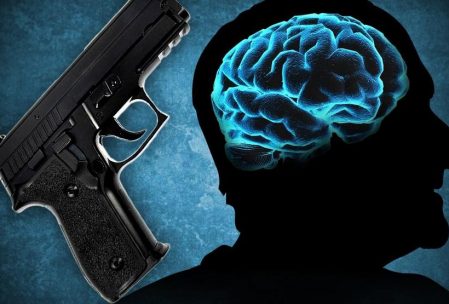Mental health to blame for shootings?

In a recent address, president Trump said, “We must reform our mental health laws to better identify mentally disturbed individuals who may commit acts of violence and make sure those people not only get treatment but when necessary involuntary confinement.”
President Trump may not be an expert on mental health but one accurate point is the need for increased access to mental health treatment.
Another comment he made, “Mental illness and hatred pulls the trigger, not the gun.” Well, experts may not agree with the president here. There seems to be a theme of fear and separation between groups of people in recent years. When we are scared and separated from others we loose many of the more developed of human skills. Infact, when humans are scared the fight or flight response can be triggered and it becomes mach harder if not impossible to use higher order thinking such as future planning, empathy, and advanced problem solving.
The fight or flight response is a powerful force to keep us alive however, it has one purpose to keep us alive number one. Anything else can get tagged by this system as auxiliary and a possible risk to survival. Taking the time to think about a possible threat can get us killed so quick decision to destroy the threat or separate ourselves from it are frequently the only options when the fight or flight system is actiavted.
The fight or flight system is not bad or good but it is a very powerful system. It frequently is at work as a reflex meaning we typically are not aware of its impact on us. As individuals and as a society increased awareness of this process in our lives can be powerful and freeing!
Experts from the American Psychological Association, have called it “unfounded”to blame mass shootings on mental illness in place of considering other possible factors, such as hate, bigotry and access to assault weapons. Not that access to assault weapons has to be good or bad. However, access can increase risk statistically.
Calling every mass shooting a mental health problem is “inaccurate and it’s stigmatizing,” said Arthur Evans, chief executive officer of the American Psychological Association.
Mental illness affects millions of adults across the country. About 1 in 5 adults in the United States, or 46.6 million, experience mental illness in a given year, according to the National Alliance on Mental Illness.
It might be suggested that, when fear activates the fight or flight systems, people are more willing to destroy things and each other and others are more willing to control and isolate individuals who are identified as a threat rather then working to better understand what is occurring. Labeling scary things like shootings as the direct result of mental health is not likely helpful or accurate in the long run.
Dr. Davenport is. a Licensed Psychologist in Sarasota and Venice, FL who treats anxiety, depression and relationship problems with children, adolescents, and adults. Please call 941-321-1971 to schedule an appointment.

